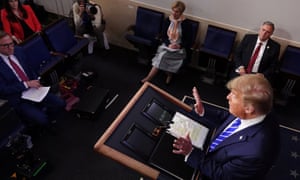Pence says federal agencies could take over response in coming weeks as Trump acknowledges ‘some people will be affected’
- Coronavirus – latest US updates
- Coronavirus – latest global updates
- See all our coronavirus coverage

Photograph: Jonathan Ernst/Reuters
Donald Trump is preparing to wind down the White House coronavirus taskforce even as the US death toll has topped 70,000 and experts warn that the worst is yet to come.
Mike Pence, the vice-president and taskforce chair, said on Tuesday that coordination of the pandemic response could be transferred back to federal agencies in late May or early June.
But in the wake of a leaked internal White House report suggesting that the daily US death toll will climb to 3,000 per day by June, the move is likely to fuel concerns that Trump has all but abandoned a public health strategy in favour of economic imperatives.
“I’m not saying anything is perfect, and yes, will some people be affected? Yes,” Trump said during a trip to Arizona – a battleground state in the 2020 presidential election – on Tuesday. “But we have to get our country open, and we have to get it open soon.”
Hillary Clinton, a former secretary of state and 2016 presidential candidate, tweeted: “It appears the plan is, shamefully, to have no plan. Americans will suffer. We must replace this administration in November.”
David Axelrod, former chief strategist for Barack Obama, added on Twitter: “If you can’t shut down the virus, shut down the taskforce.”
Pence was responding on Tuesday to questions about a New York Times report that said officials in the Trump administration were telling the 22 taskforce members and their staff to expect the group to be phased out within weeks.
“I think we’re starting to look at the Memorial Day [25 May] window, early June window as a time when we could begin to transition back to having our agencies begin to manage our national response in a more traditional manner,” the vice-president said, according to a pool report.
Pence insisted that “it really is all a reflection of the tremendous progress we’ve made as a country” and promised to keep the response coordinator, Deborah Birx, “around every bit as long as we need to”.
Birx herself said: “We’ll still keep a close eye on the data because we have very good data now. It took us a while to build that capacity. And we’ll make sure that, you know, we’re watching that at a federal level.”
But there was also immediate confusion. Even as Pence spoke, Anthony Fauci, a leading taskforce member, was denying the Times’s report. “That’s not true,” the infectious disease expert told CBS News. “I’ve been in every taskforce meeting, and that’s not what they are doing.”
The taskforce was created in late January and Pence was named as chairman in late February. It met frequently to address the rapidly spreading pandemic and then explained its work in nightly press briefings dominated by Trump that sometimes lasted more than two hours.
But the president was accused of using the platform to score political points, with Republican allies eventually warning that the briefings were damaging him at the polls.
After a briefing in which Trump floated the idea of treating the virus with disinfectant injections, the events were soon killed off. There has now been no briefing for more than a week and the taskforce is meeting less frequently.
Its demise would be the latest sign that the White House is pivoting towards the first phase of Trump’s plan to reopen the country after many states ordered people to stay at home to slow the spread of the virus. The president has urged supporters to “liberate” states from pandemic restrictions and signalled approval for armed protesters who have defied his own social distancing guidelines.
On Sunday, Trump held a Fox News virtual town hall at the Lincoln Memorial in Washington and was joined by Pence and the treasury secretary, Steven Mnuchin, putting an emphasis on the economy.
Laura Ingraham, a Fox News host whom Trump follows closely, applauded the winding up of the taskforce. “For too long it seemed like unelected doctors were making policy,” she tweeted. “Economic toll was disastrous.”
Kayleigh McEnany, the White House press secretary, denied that health concerns were being neglected: “Reporting on the task force is being misconstrued to suggest the White House is no longer involving medical experts,” she tweeted. “This is totally false. President Trump will continue his data-driven approach towards safely re-opening.”
But to critics, the timing is awry. On Monday, researchers at the University of Washington’s Institute for Health Metrics and Evaluation almost doubled its previous US mortality model to more than 134,000 from 72,400 on 29 April. The change reflected “rising mobility in most US states” with an easing of business closures and stay-at-home orders expected in 31 states by 11 May, the institute said.
Fauci warned in a CNN interview on Monday that there would be a “rebound” of new coronavirus cases in the US if the country rushes towards a “premature” reopening of society and business. “How many deaths and how much suffering are you willing to accept to get back to what you want to be some form of normality sooner rather than later?” he asked.
Elaine Kamarck, a senior fellow in the governance studies programme at the Brookings Institution thinktank in Washington, said any attempt to sideline Birx and Fauci was doomed. “He might try to marginalise them but the press isn’t going to try to marginalise them.
“They are the people with the data and with the expertise and nobody with data and expertise is going to be marginalised. It’s going to be the politicians who don’t listen to the scientists who are going to get marginalised.”



